Driving a hydrogen-powered car through Bremen
Hydrogen in BremenHow the hydrogen infrastructure is expanding in the Hanseatic city
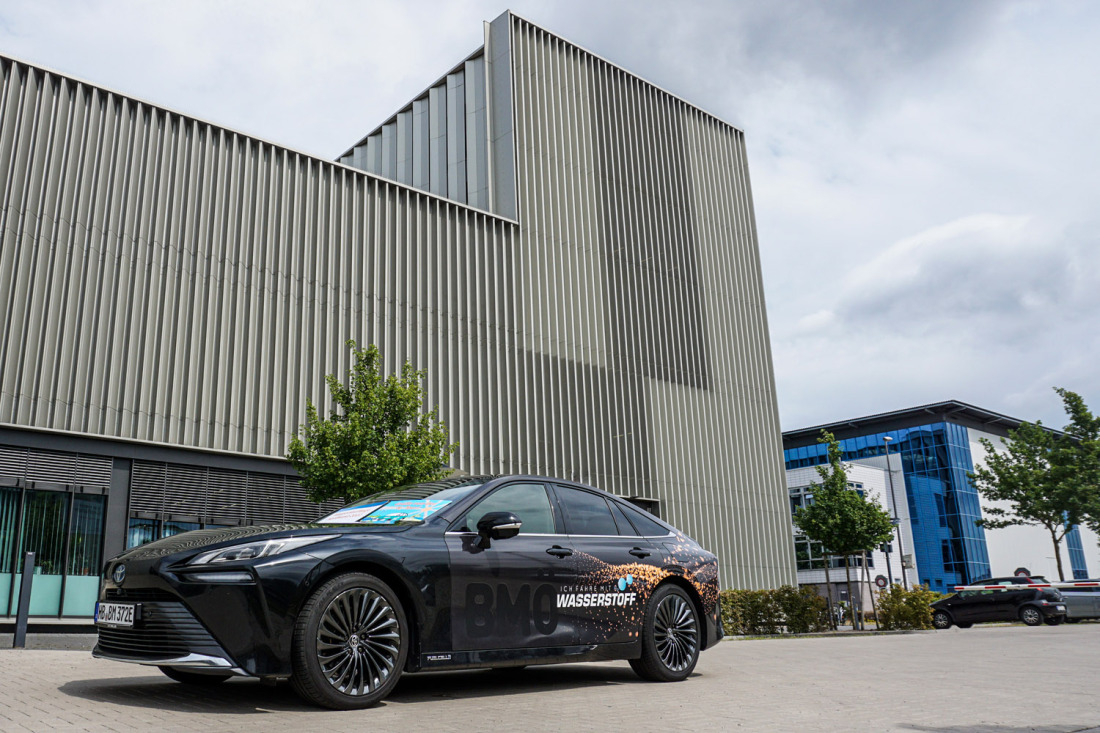
How does a hydrogen-powered car work? How do you fill it up? And is it all safe? There's a lot of questions about driving with hydrogen. One of the very first users of this technology has given us an insight into this topic on a tour of Bremen and also shown us just what's happening with this volatile gas in the city.
We're currently standing at the only public hydrogen filling station in the city of Bremen, in the Osterholz district. One of the pumps dispenses volatile gas, alongside petrol and diesel. A thick hosepipe leads to the nozzle. When you connect it to your tank, you need to wait for an "OK" signal from the pump. The pump automatically checks that the connection is secure (you hear a "pop") before allowing the hydrogen to flow. Nothing happens unless the connection is safe and secure.
Today, it's Ronald Rose who is at the pump. The Bremen local regularly fills up his Toyota Mirai here. And that means up to 5.6 kilogrammes of hydrogen. That doesn't sound like much, but compressed hydrogen has enormous energy density. "Realistically, this will give me a range of around 450 kilometres", said the enthusiastic hydrogen fan. Currently, one kilogramme costs 12.85 Euros, in other words around 16 Euros per 100 km.
The pump feeds the energy-rich gas into the car, at a pressure of up to 800 bar, to fill the tank to a maximum pressure of 700 bar. A few minutes later, the car can be back on the road. "I can fill this car as quickly and easily as a standard fossil fuel-burner", explained Rose.
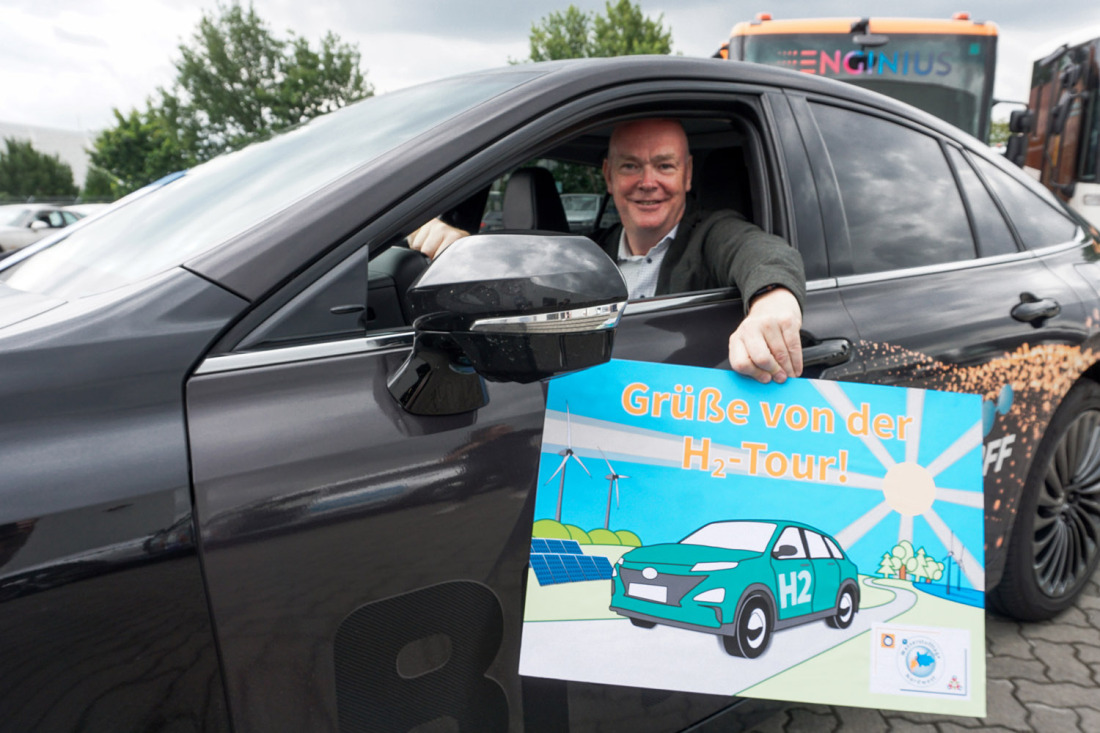
Fast acceleration, quiet to drive
On the road, this saloon behaves like a battery-powered car. It's powerful when you step on the accelerator and quiet when cruising along. The cockpit is dominated by two large screens. If you're looking for analogue displays, you're in the wrong place here. Even the rear mirror is a display screen.
"I think of myself as an ambassador for hydrogen. I've already inspired other people to buy hydrogen-powered vehicles. They are ideal for everyday use", said Rose, steering the five-metre long car through the city traffic.
Rose is the Managing Director of BMÖ, the Bremen oil company. The company runs 36 filling stations in and around Bremen and supplies heating oil and lubricants to wholesalers. Strictly speaking, fossil fuels are his bread and butter.
So why is Rose so enthusiastic about hydrogen?
Driving with hydrogen is a project that is both close to his heart and also chimes with his vision for the future. "I'm doing this for my children. Young people have the right to a future, and I'm one of those people who are thinking ahead. Thinking about will happen tomorrow" stated the 58 year-old.
And, he views hydrogen as one of the key sources of power for the energy revolution of the future. He's dedicated to playing his part in creating this future by promoting the use of hydrogen in his personal life and business activities alike. His company already operates a hydrogen filling pump in Oldenburg, and others are planned for Cuxhaven and in Bremen's Oslebshausen district.
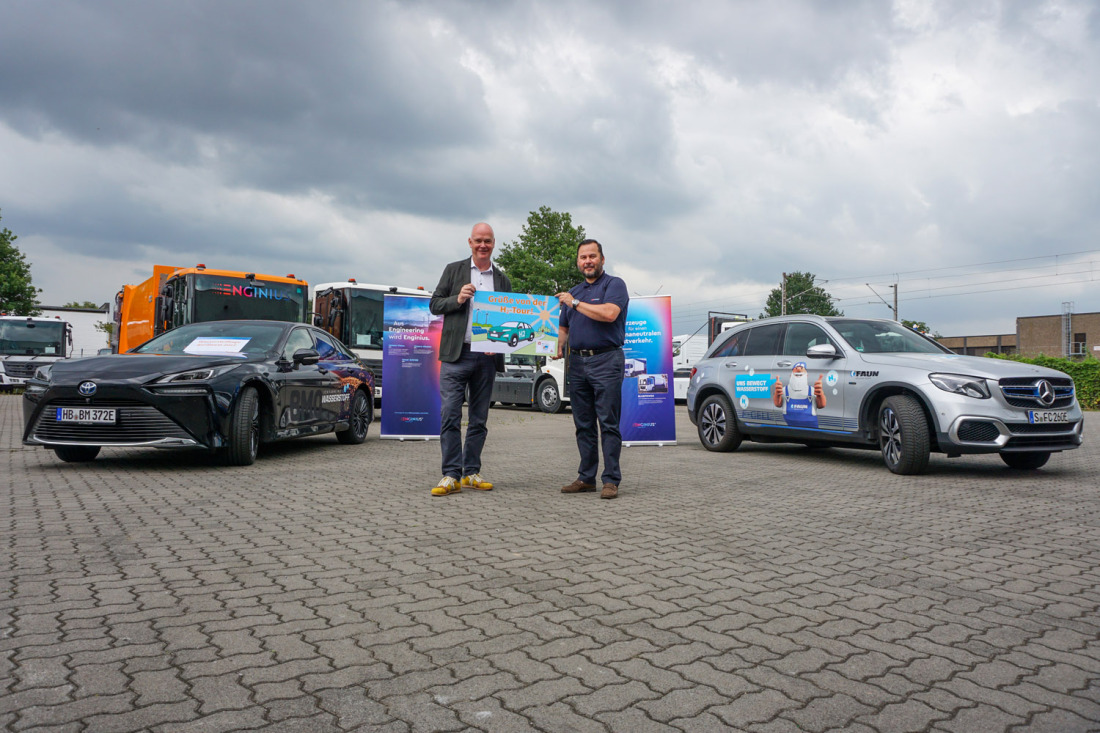
First stop: Enginius
This is why he's driving us through Bremen today, in his hydrogen-powered Toyota. To promote the "hydrogen days" in the metropolitan region of North-Western Germany, a range of different vehicles are being driven around Northern Germany, delivering greetings cards to raise awareness of this issue.
The first stop is at the business premises of Enginius, a company located not even a kilometre away from the hydrogen filling station in Bremen's Osterholz district. Here we're welcomed by Carlos Aramayo, Managing Director of Germany's first manufacturer of exclusively hydrogen-powered commercial vehicles. This is where the company, a subsidiary of the FAUN Group, builds the chassis for hydrogen-powered dustbin lorries. Other heavy-duty commercial vehicles will be added to the range later on this year.
Rose has his eyes on future demand
In future, he also wants to become involved with hydrogen-powered lorries. He believes they have great potential. "I'm not building filling stations to meet current demands. There simply aren't enough hydrogen-fuelled cars on the road. However, things may soon look very different when it comes to commercial vehicles. In addition to Enginius, major manufacturers are also busy working in this area", he explained, adding "Of course, we'll have to invest money in this first, but we're convinced that the technology is the right one. We can already make use of it today, and it will be even better in future."
Sometimes, hydrogen is seen as a competitor to alternative environmentally friendly motive power sources such as purely battery technology, and sometimes it's seen as complementary to them. It is already in use in a range of applications such as in road and rail vehicles, aircraft and ships. It's not yet certain which technology will win out in the end.
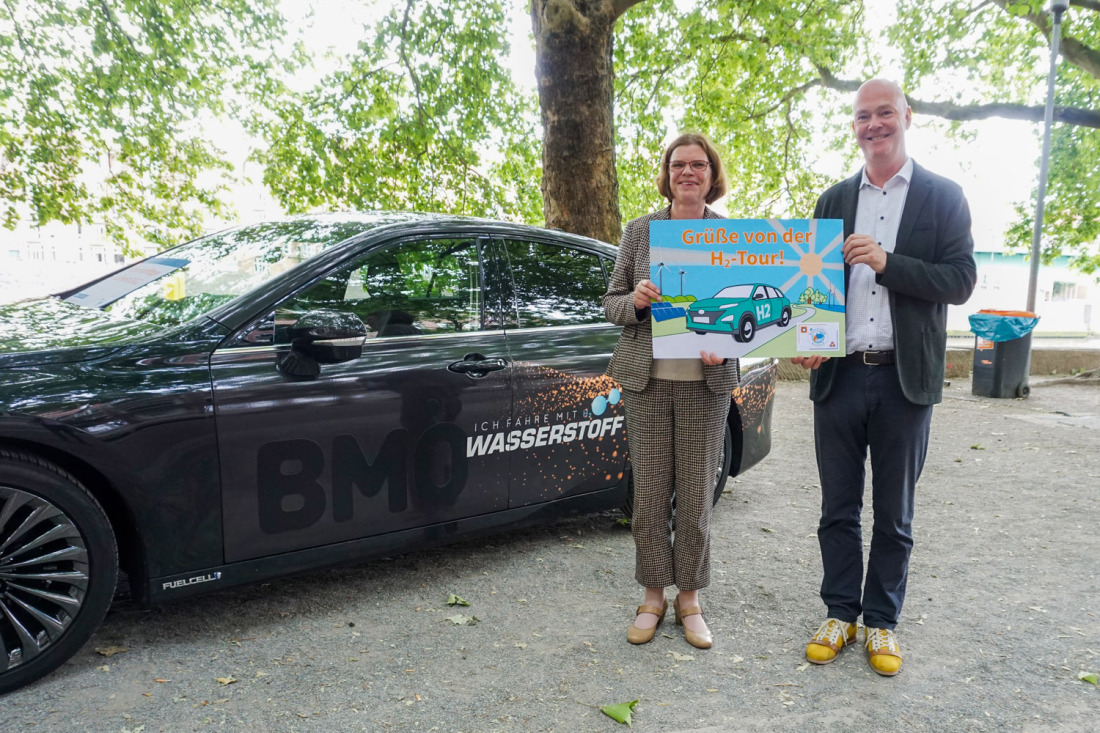
The energy revolution is a collaborative effort
"There isn't one single technology that will work for everything. Batteries are not the "magic bullet". And we're supplying the alternative", said Ronald Rose, in agreement with this assessment, as he steered his Toyota along the A27 city highway to the next stop on his "hydrogen tour". The car continues smoothly on its way. The 134 kW electric motor is powered by the battery which, in turn, is powered by the fuel cell as the car is being driven.
The next stop is in Bremen's city centre or, more precisely, the Senator for Economy, Employment and Europe, who is also given a greetings card. The Senator is also closely involved with working on the future uses of hydrogen, as part of the Geschäftsstelle Wasserstoffwirtschaft (hydrogen-based economy office).
Here, everyone knows that the energy revolution can only succeed if the economy and the world of politics work together. In Bremen, the host of projects involving every aspect of hydrogen and renewable energy are setting the course towards this future.
Rose is also open to this type of cooperation. For example, in Oldenburg, he is a partner in the "H2.OL" project, in which business and science are working together to build a hydrogen infrastructure in this North German city. And in Bremen, he's currently working on a "H2 hub" in the west of the city which will supply this gas, generated using carbon-neutral technology, to consumers in the region.
As Rose said, "I find the open-mindedness of Bremen's politicians towards the subject of hydrogen refreshing".
Rose is an idealist, but also one that gets personally involved and is keen to implement his vision. Twelve of his filling stations will be fitted with hydrogen fuel pumps in the near future. And, of course, by doing this he's creating a vision of the future because exclusively battery-powered cars don't usually go to filling stations, as they need to be connected to charging stations for a considerable time, to "fill up". His projects will not only drive forward technical progress but also create a demand.
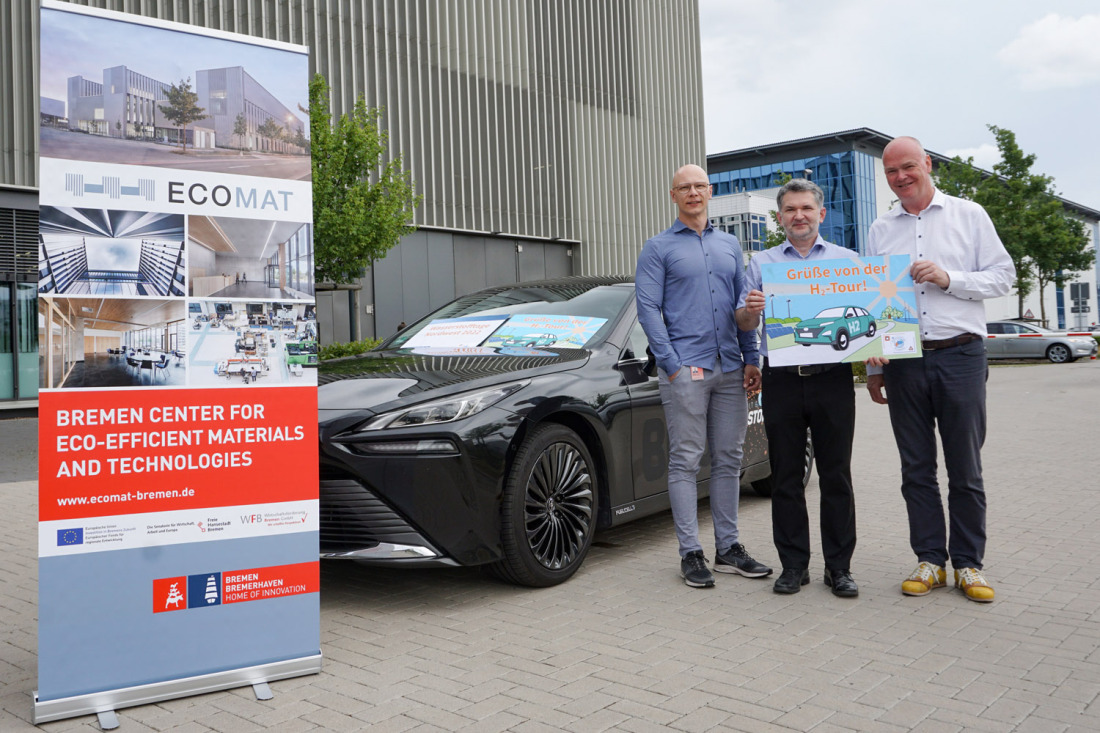
Hydrogen on land and in the air
The last stop on this journey takes us to Airport-City Bremen, to ECOMAT. Around 500 scientists are hard at work in this research and technology centre, on projects which include climate-neutral flight.
Hydrogen is regarded as a very promising source of energy for aircraft. In contrast to a hydrogen-powered car, an aircraft uses cryogenic hydrogen, where the gas is cooled to minus 250 degrees Celsius. The gas liquefies at this temperature and therefore takes up less space. The tanks used are also lighter than those used in cars, but also more complicated and expensive to produce.
These tanks are a specific focus of activities at the Bremen research centre. In recent weeks, new test equipment has been built there to enable the scientists to investigate new materials. Here, it is Dr. Ernö Sándor Németh from the Fibre Institute Bremen who receives the greeting card. The conversation quickly turns to hydrogen-powered cars and subjects such as Type 4 tanks, pressure ratings and tank leakages, hydrogen diffusion and the work being carried out jointly with the "neighbours", ArianeGroup.
The tour of Bremen also comes to an end at ECOMAT. Rose, the hydrogen enthusiast, gave a positive summary of this brief tour. "There's still a lot of anxiety about hydrogen, but this is totally unfounded. We can use and handle hydrogen safely, and the trip today has shown that there's already quite a lot going on in Bremen. However, I'd like to think that this is just the beginning. The technology is still in its infancy, and there's a great deal of room for development."
Hydrogen filling stations in the North West of Germany
At present, there are three hydrogen filling stations in the region: in Oldenburg, Stuhr and in Bremen. Another is currently under construction in Bremerhaven and more are being planned, for example, elsewhere in Bremen, and in Cuxhaven. The map below provides an overview: https://h2.live/
Success Stories
Bremen’s Economy in Figures: Statistics 2025
The State of Bremen is a strong economic hub. A look at the latest statistics highlights its economic strength — summarising key data such as cargo volumes, export performance, industry turnover, and more.
Learn moreMedium-Sized Companies in Bremen Showcasing the Full Range of the Local Economy
Medium-sized companies form the backbone of Bremen’s economy. They create jobs and produce goods that are in demand worldwide. Here is a selection of ten businesses that illustrate the diversity of Bremen’s economic landscape.
Learn moreTwelve international food and beverage companies in Bremen
Becks and Melitta may be high-profile brands, but international food and beverage companies also manufacture lots of other products in Bremen and Bremerhaven. Here are twelve examples.
Learn more
